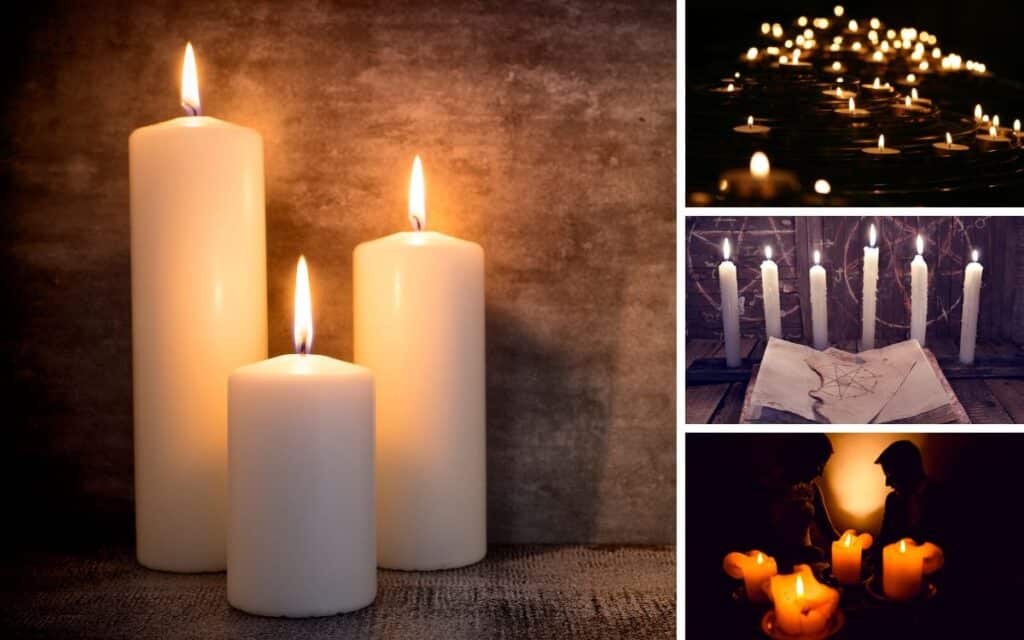Here’s some enlightening facts on Candle superstitions in British Folklore

Candles superstitions and folklore
Candles, with their flickering flames, have long held a special place in our homes and hearts.
Whether setting the ambiance for a romantic dinner, lighting the darkness during power outages, or adding a touch of magic to birthdays, these ancient household items have often been shrouded in mystery and superstition.
In British folklore, their significance goes beyond mere illumination. Let’s delve into some intriguing superstitions related to these waxen wonders.
The Magical Flames of Candles
Banish the idea that only witches in dimly lit lairs used candles for magic. In truth, many homes in earlier centuries couldn’t afford the luxurious beeswax candles, which were primarily found in churches. Most households used tallow candles, made from animal fat, or rushlights.
Yet, magic and candles are undeniably intertwined.
- Blowing out candles on a birthday cake, for example, is a universal form of magic. This tradition has a fascinating belief attached: if all the candles are blown out in a single puff, the wish will come true.
- Candles in spiritual faiths, such as Wicca, are ‘charged’ with desires or wishes, which get released into the universe when the candle burns. The chosen candle often corresponds with the intention – pink for love, blue for healing, and orange for success in business.
Candles and the Church
Candles have always been a staple in religious ceremonies:
- In Catholic churches, candles may symbolize Christ, the “Light of the World”, or represent prayers being offered. Their usage in churches might trace back to Old Testament days.
- They also feature in Diwali, the festival of light celebrated by various religions, and in other religious festivals globally.
Christmas Candles and Traditions
The custom of burning candles on Christmas Eve, especially a long one, gifted by the grocer to his customers, was prevalent in parts of England. It was considered a harbinger of misfortune to light this candle too early or snuff it out before supper ended. Such candles were believed to fend off bad luck and were preserved until the next year.
Warding Off Spirits with Candles
Fire, in many forms, has been a beacon against darkness and the malevolent entities hiding within:
- On Halloween, placing a lit candle inside a Jack o’lantern is believed to repel evil spirits.
- Some legends suggest that candles can act as a supernatural Davy lamp. If a candle’s flame burns blue or suddenly blows out, it’s considered a sign of nearby spirits or ghosts.
- Interestingly, peering into a mirror by candlelight was said to reveal any spirits residing in your home.
Intriguing Superstitions
Candles, over the centuries, have garnered a elaborate tapestry of beliefs:
- A candle that burns out invites thieves or spells misfortune. Given candles were once the primary light source, letting them burn out was akin to wasting money.
- Gossips were believed to be nearby if a candle flame suddenly leaped.
- It was considered an ill omen to bring a lit candle into a room with a sick person. If the smoke drifted towards the church, it signified impending death for the patient.
Candles, simple as they may seem, are a reservoir of myths, beliefs, and traditions in British folklore. While some superstitions might seem far-fetched in the modern era, they serve as a fascinating glimpse into the past, showing how our ancestors made sense of the world around them.
Today, while we might not adhere to all these superstitions, candles still enchant us with their warm glow and the rich history they carry.
Have we missed any of your favourite candle superstitions? Tell us in the comments section below!







